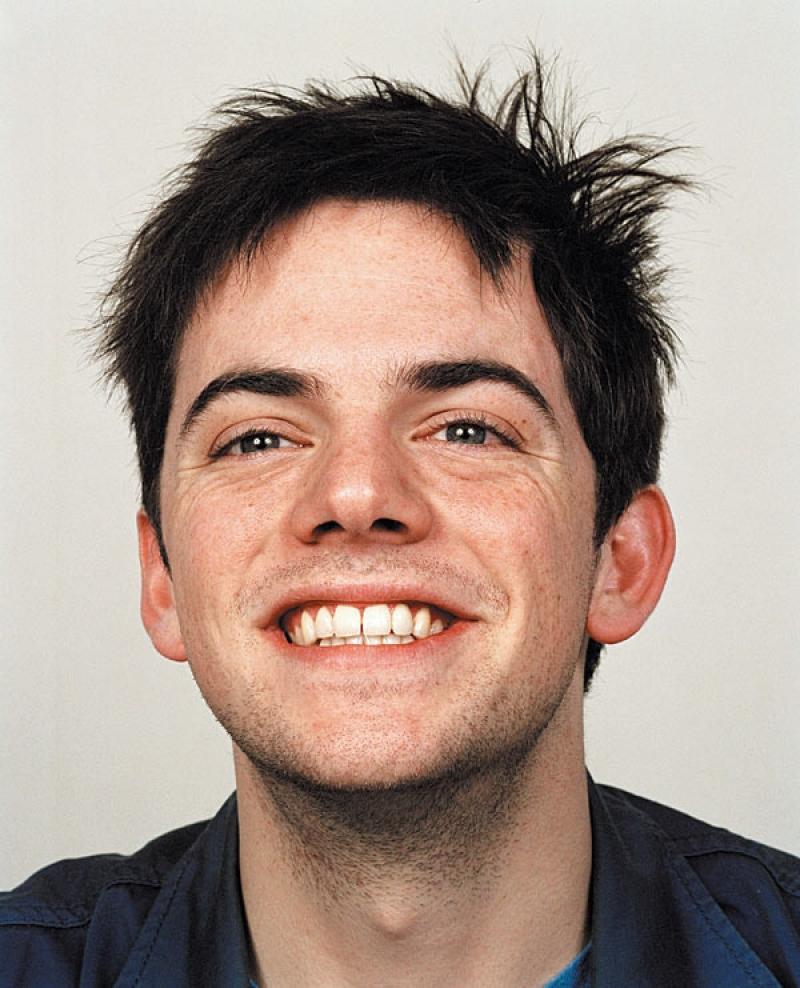Nico Muhly & the Britten Sinfonia, The Roundhouse | reviews, news & interviews
Nico Muhly & the Britten Sinfonia, The Roundhouse
Nico Muhly & the Britten Sinfonia, The Roundhouse
Young New York composer disturbingly collides folk, electronica, minimalism and more

Nico Muhly didn't have to work much to puncture any atmosphere of classical recital formality at the Roundhouse: he only needed to be himself. Young, slightly dorky and very camp, wearing a black garment that blurred the boundaries between cardigan and bathrobe, and bantering lightly with the audience, the Vermont-born New York-based composer gave the impression that he couldn't take himself too seriously if he tried.
His performance began with lightness of touch, too, with a recital of the solo piano piece “Mad Rush” by Philip Glass, for whom Muhly often conducts, arranges and plays piano. It was a perfect choice, neatly demonstrating the blurred area between musical seriousness and populism, virtuosity and sensualism in which Muhly operates. Popular with ambient/electronica artists and DJs and a clear influence on the likes of Sigur Rós and Coldplay, the flickering arpeggios of “Mad Rush” are nonetheless demanding, and coaxed the audience into a settled, focused state.
For a performance of his own “Step Team”, Muhly then handed over to conductor Nicholas Collon and the Britten Sinfonia. It was easy to see why he was wary of conducting it himself: “Step Team”, originally inspired by the “Double Dutch” skipping rhythm of New York schoolgirls, is rhythmically fabulously complex. Its real strength, like a sort of funky Stravinsky with hints of salsa, is that it grooves – however complex the cross-rhythms and unexpected interjections, there is the sense of a constant line of bodily motion running through it all. Later in the piece, this steady centre approached the drone and psychedelic intensity of Terry Riley, and particularly when one-note riffs bounced between the instruments, it felt as if its modularity could have been influenced by modern techno; a slow movement, while still playful, brought the sublime arrangements of Gil Evans to mind.
Two songs performed with the delightfully deadpan young Vermont folk singer Sam Amidon changed the mood again. This time Muhly's orchestral backing took on a Disney quality, full of romantic tropes and playfulness – but it became a fearful Disney, packed with apocalyptic portents and symbols. Perhaps the closest analogue would be the “low art” of Mark Ryden, where children's book illustration collides with disturbing mysticism and images from the American subconscious.
A third song in which Amidon was joined by Norfolk folk-pop singer Beth Orton became even more deeply peculiar as the arrangements, including angry percussion swelled up around the song, threatening to topple it completely.
After the interval, Collon returned in impeccably-cut suit to conduct Muhly's witty deconstruction of serialism “By All Means” - again a piece that grooves joyfully, as evinced by Collon's tush-shaking conducting style at key moments. This piece reached peaks of fierceness that “Step Team” hadn't, though: rising like a light-hearted discussion straying into difficult territory, then arguing itself to a satisfactory conclusion. It was by no means lightweight music; however it was blown out of the water by the astonishing piece that followed.
“The Only Tune” was based around Amidon performing a deconstructed, and deeply disturbing, archaic folk ballad filled with sororicide, fear of the elements and hints of necrophilia, while the Sinfonietta conducted by Muhly amplified and further dramatised the song, and Valgeir Sigurðsson – the influential Icelandic producer on whose Bedroom Community label Muhly's work is released – provided ambient sound and processing of the live instruments via his laptop. Amidon remained a still centre, impassive as before, while his banjo, acoustic guitar and impressively powerful singing somehow kept in perfect synchronisation with the kaleidoscopic orchestral/electronic chaos around him. The whole effect was beautiful and terrifying, ever-changing and full of a truly bizarre collision of a pagan sense of atavistic déjà entendu and a chilling feeling that it was opening portals into a dark future.
A final performance of Steve Reich's “City Life” complete with samples of New York traffic, with Muhly conducting as if rave dancing, simply couldn't compare with the unique and disturbing glories of “The Only Tune”. Muhly might be a lighthearted and engaging character in person, there might be a sense of fun and groove in some of his compositions, and he might be working hard to take orchestral music out of its cloisters and conservatoires – but there is nothing lightweight whatsoever about his work overall. At 28 years old, he is clearly already a very important figure in modern music.
Add comment
The future of Arts Journalism
You can stop theartsdesk.com closing!
We urgently need financing to survive. Our fundraising drive has thus far raised £49,000 but we need to reach £100,000 or we will be forced to close. Please contribute here: https://gofund.me/c3f6033d
And if you can forward this information to anyone who might assist, we’d be grateful.

Subscribe to theartsdesk.com
Thank you for continuing to read our work on theartsdesk.com. For unlimited access to every article in its entirety, including our archive of more than 15,000 pieces, we're asking for £5 per month or £40 per year. We feel it's a very good deal, and hope you do too.
To take a subscription now simply click here.
And if you're looking for that extra gift for a friend or family member, why not treat them to a theartsdesk.com gift subscription?

Comments
...
...
...